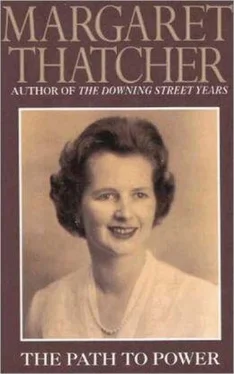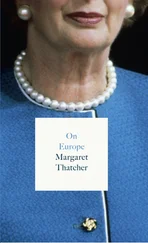Problems of Socialist England (1947).
The Party’s staff college in Yorkshire, where everyone from ordinary Party members to Cabinet ministers attended courses and discussions on policy.
A.V. Dicey, Introduction to the Study of the Law of the Constitution (8th edition, 1915), pp. 465-6.
Admittedly he went on, as I used to point out: ‘What is beginning to worry some of us is “Is it too good to be true?” or perhaps I should say “Is it too good to last?” for, amidst all the prosperity, there is one problem that has troubled us in one way or another ever since the war. It’s the problem of rising prices.’
‘Pairing’ is an informal arrangement by which pairs of MPs from opposing parties agree to abstain in parliamentary votes when one or other of them wishes to be absent from the House of Commons. The arrangement does not usually apply to crucial votes.
See pp. 247-9; also The Downing Street Years , pp. 642-67.
A Balance of Power (1986), p. 42.
Exchange Rates and Liquidity.
Desmond Donnelly was a Labour MP for almost twenty years. He resigned the Labour whip in 1968 in protest at the withdrawal from east of Suez and died a Conservative.
In Place of Strife was the — in retrospect ironically chosen — title of a Labour White Paper of 1969 which proposed a range of union reforms. The proposals had to be abandoned due to internal opposition within the Cabinet and the Labour Party, led by Jim Callaghan.
See p. 198.
Direct grant schools, which included some of the most famous and successful secondary schools in Britain, entry to which was often highly competitive, were funded direct from the DES and were outside local control.
The Assisted Places Scheme makes public funds available for gifted children from poorer backgrounds to take up places in private schools. Grant-maintained schools are state schools which have opted to move outside local education authority control.
See p. 219.
See pp. 213-30.
The PAR system was a characteristic innovation of the Heath Government — an ambitious attempt to review existing departmental programmes with the professed intention of radically reducing the role of Government, but with little or no effect.
See p. 232.
For the Department of Education and Science, see the previous chapter.
‘The Lesson’ (1902). The lesson in question was the Boer War, in which Britain had suffered many military reverses.
A State of Emergency may be proclaimed by the Crown-effectively by Ministers — whenever a situation arises which threatens to deprive the community of the essentials of life by disrupting the supply and distribution of food, water, fuel or light, or communications. It gives Government extensive powers to make regulations to restore these necessities. Troops may be used. If Parliament is not sitting when the proclamation is made, it must be recalled within five days. A State of Emergency expires at the end of one month, but may be extended.
John Poulson was an architect convicted in 1974 of making corrupt payments to win contracts. A number of local government figures also went to gaol. Reggie Maudling had served on the board of one of Poulson’s companies.
‘n-1’ was a semi-official policy that each year’s pay increase should be 1 per cent less than the previous year’s.
Hansard, 13 June 1972: Volume 838, columns 1319-20.
See pp. 497-8.
Patrials were those citizens of the United Kingdom and Colonies whose parents or grandparents were born in the UK; citizens of the UK and Colonies who had been settled here for five years; any Commonwealth citizen who had a father or mother or grandparent born in the UK.
Alan Walters became my economic adviser as Prime Minister 1981-84 and again in 1989.
Mi comprised the total stock of money held in cash and in current and deposit accounts at a particular point in time; M3 included the whole of Mi, with the addition of certain other types of bank accounts, including those held in currencies other than sterling.
A property revaluation was due every five years, but was often postponed.
i.e. Foreign Secretary, Chancellor of the Exchequer, Home Secretary.
Jim Prior and Geoffrey Howe had nineteen votes each and John Peyton eleven.
For the referendum see pp. 330-5.
See pp. 335-6.
See pp. 397–403.
Alan Walters was then Cassel Professor at the London School of Economics. He left the following year for the United States to work for the World Bank. As already noted, he was my economic adviser as Prime Minister, 1981-84 and in 1989. Brian Griffiths (later Head of my Policy Unit at No. 10) was then a lecturer at the London School of Economics; he became a professor at the City University the following year. Gordon Pepper was an economic analyst at Greenwell & Co., and an expert on monetary policy. Sam Brittan then as now was Principal Economic Commentator on the Financial Times.
See Chapter X.
See pp. 397-403.
The Mace — a silver gilt staff topped by an orb and cross — symbolizes the authority of the Crown delegated to the Commons. It rests on the table facing the Speaker when the House is sitting, within easy reach of the two front benches.
For our differences on foreign affairs, see pp. 351-3, 361.
For Wales there would be no such Assembly, but rather a Welsh Select Committee, a strengthened Welsh (advisory) Council, and Welsh spending would be financed by block grant.
For further discussion of referenda see pp. 480, 501.
See pp. 312-13.
See pp. 349-53.
Henry Kissinger, Diplomacy (New York, 1994), p. 717. This is, of course, an oversimplified description of the concept. Diplomacy contains a fuller, masterly account of Dr Kissinger’s thinking.
Typical of the coverage was an article from the Wall Street Journal (20 August 1975) I found in my briefing papers. It began: ‘Hardly anyone needs to be told now that Great Britain is the sick country of Europe. Everywhere you look the evidence abounds.’ The article described our position — falling output, runaway inflation, declining industries, a falling (and relatively low) standard of living. Its author reflected: ‘It is all very curious. For Britain has not been brought to this state by defeat in war, by earthquakes, plagues, droughts or any natural disasters. Britain’s undoing is its own doing. It has been brought to this by the calculated policies of its Government and by their resigned acceptance by the people.’
Читать дальше












